Foreign Luxury Brands Target Local Suppliers
On September 5, the global debut of BMW's first mass-produced model of the new generation, the BMW iX3, took place. Simultaneously, a live exploration of the research and production base for its China-exclusive version was conducted in Shenyang. This model, deeply tailored to meet the demands of the Chinese market, is set to officially launch within this year and plans to achieve mass production by 2026.
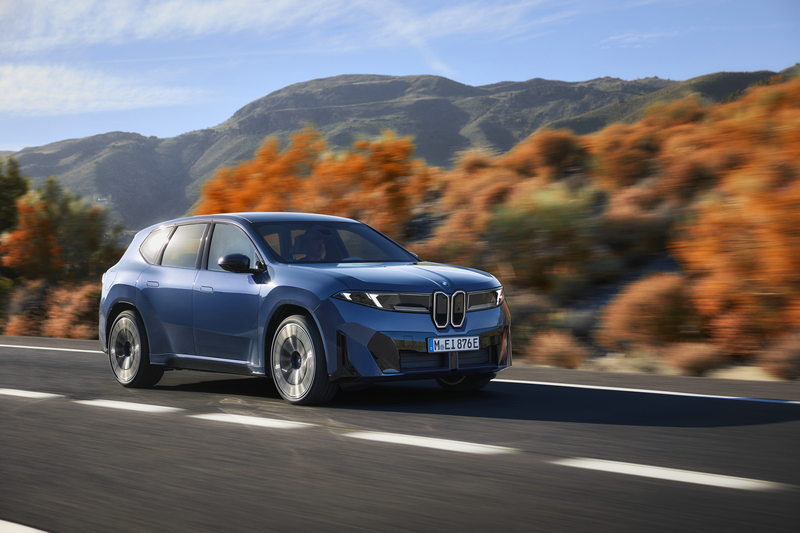
Image source: BMW Group
As a culmination of China's supply chain technology and local R&D wisdom, the launch of the BMW iX3 China Exclusive Edition is far more than a simple product iteration; it represents a crucial step in BMW's localization strategy. Through this new car, a profound trend of industry transformation is becoming increasingly clear: multinational luxury brands, which once relied on their century-old brand halo and global unified technical standards, viewing the Chinese market merely as a "sales battlefield," are now waving goodbye to their "passive response" stance and shifting towards "proactive reshaping" with a core focus on deep integration with the local supply chain.
Supply Chain Shift: Localization Strategies of Foreign Luxury Brands
In the current wave of electrification and intelligence sweeping the global automotive industry, collaboration with local Chinese suppliers has become a key pathway for foreign luxury brands to consolidate their market position and achieve technological breakthroughs.
For example, in the field of intelligent assisted driving, many foreign luxury brands have simultaneously extended an olive branch to Chinese suppliers for cooperation.
In 2017, Mercedes-Benz made an initial investment in the Chinese autonomous driving technology company Momenta. According to news from last December, it plans to increase its investment in Momenta and announced that it will introduce Momenta's autonomous driving software in at least four new models to be launched over the next four years. This cooperative intention not only signifies that Momenta will become Mercedes-Benz's first core technology partner in the Chinese market, but also heralds a profound transformation in the supply chain layout of foreign luxury brands.
In July this year, BMW announced a strategic partnership with Momenta to jointly develop a new generation of intelligent driving assistance solutions for the Chinese market. The two parties will focus on the forefront of intelligent driving assistance and work together to create a China-specific intelligent driving assistance solution based on the Feilun large model. This solution will be applied to multiple models, including the domestically produced new generation series, providing users in the Chinese market with all-scenario, point-to-point pilot driving assistance functions, covering both highways and urban roads.
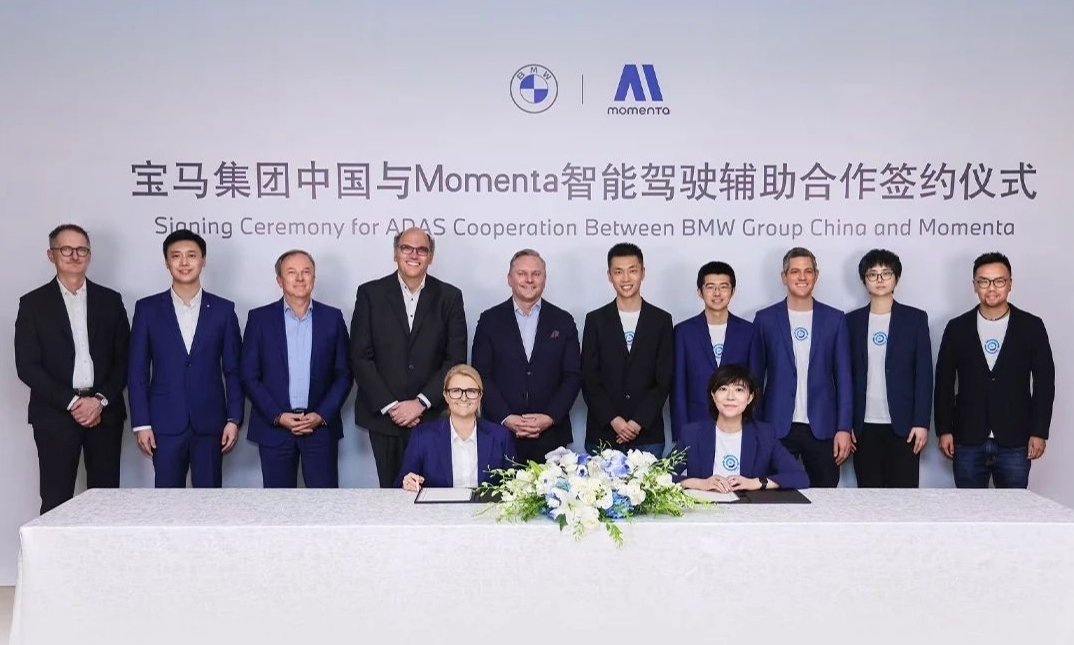
Image source: BMW Group
According to BMW, China, as a global innovation engine, has become a key pillar in its future development strategy. BMW adheres to an "open technology" approach in China, deeply integrating local Chinese innovation forces while maintaining the group's core technological advantages.
Audi is also keeping pace with the transformation. On August 1st this year, the SAIC Audi A5L Sportback was officially launched. As a brand new model under the brand, the A5L Sportback is built on the PPC platform, equipped with the fifth-generation EA888 engine and MHEV plus mild hybrid system, utilizing the E3 1.2 electrical architecture, and is also equipped with Huawei's QianKun intelligent driving system. It is noteworthy that this is the world's first model equipped withHuawei QiankunFuel vehicles with intelligent driving technology. Audi China CEO Stephan Wöllenstein stated, "The SAIC Audi cooperation project demonstrates the deep integration of the Audi brand with China's local innovation ecosystem."
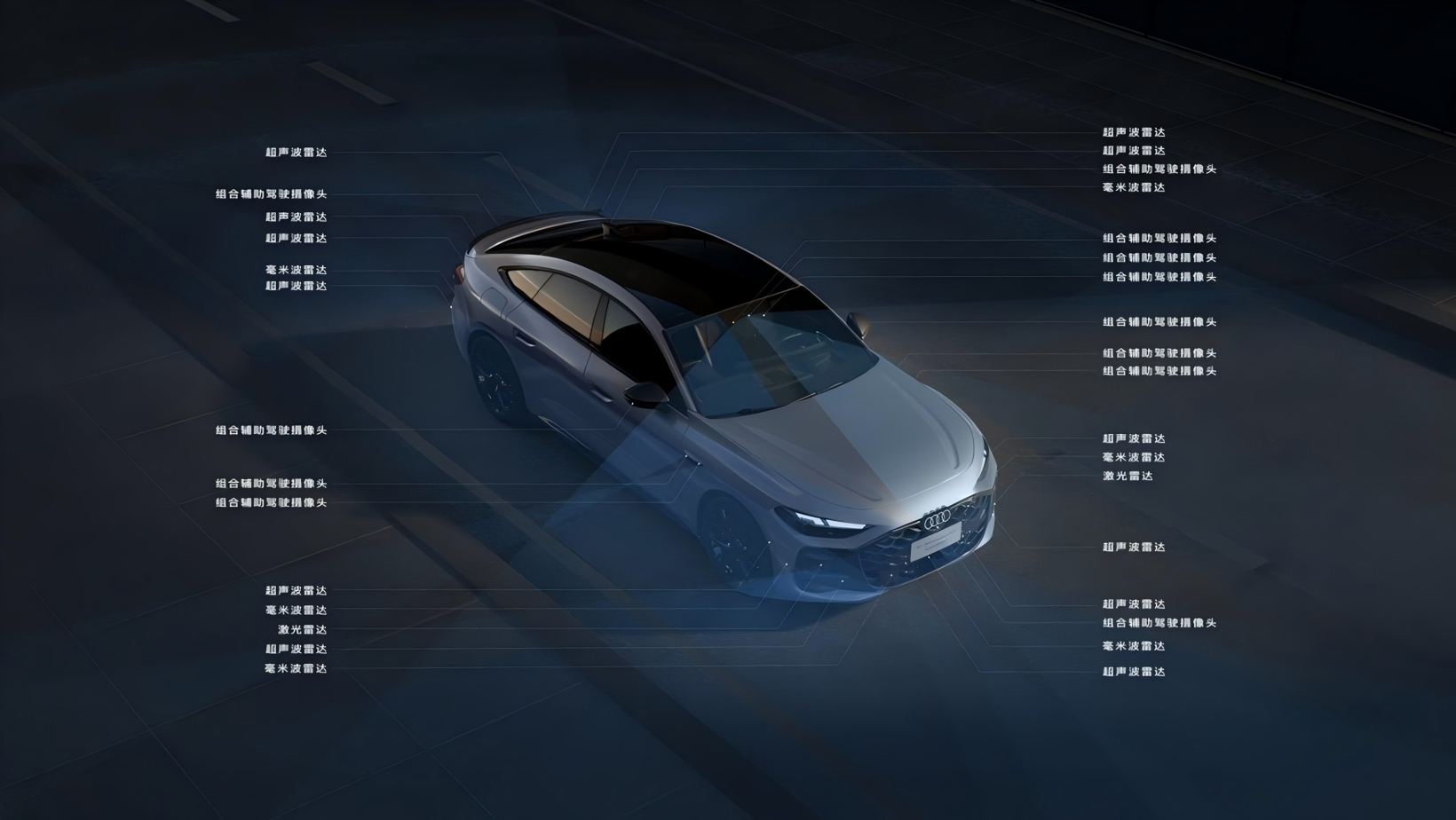
Image source: SAIC Audi
On August 18th, the luxury electric brand AUDI launched the pre-sale of its first mass-produced model, the Audi E5 Sportback. As the first mass-produced model jointly developed by AUDI and Momenta, the Audi E5 Sportback is equipped with the industry’s first “German electric luxury standard + flywheel large model” assisted driving solution co-created by both parties. The entire lineup comes standard with a combination of LiDAR and Orin-X chips, providing comprehensive high-level assisted driving capabilities covering urban, highway, elevated roads, and parking scenarios.
It is worth noting that foreign luxury brands have also shown similar trends. In April of this year, multiple media outlets reported that Porsche has begun cooperating with Horizon Robotics in the research and development of intelligent driver assistance. Based on Horizon's Journey 6P chip and HSD full-scenario solution, the two parties have formed a joint team to jointly develop an end-to-end system.Intelligent Assisted DrivingThe plan aims to achieve mass production and implementation in vehicles by 2026.
In terms of smart cockpit upgrades, foreign luxury brands have also focused their attention on Chinese tech giants.
For example, in March this year, BMW not only partnered with Huawei Terminal to jointly develop an intelligent application ecosystem based on the HarmonyOS system, but also announced with Alibaba Group the deepening of their AI strategic cooperation in China. The two parties will jointly develop an intelligent cockpit system based on Alibaba's Tongyi large language model technology, which is planned to be first installed in BMW’s new generation models produced in China in 2026.
In the field of core components for new energy vehicles, foreign luxury brands have a long history of cooperation with Chinese suppliers, yielding fruitful results.
As early as 2012, BMW became CATL's first automotive customer. The continuously deepening cooperation between the two has provided a solid guarantee for the stable supply of BMW's new energy vehicle models. Besides BMW, foreign brands such as Mercedes-Benz, Audi, and Tesla are also customers of CATL. There are also reports indicating that Porsche plans to cooperate with CATL. In addition to CATL, other Chinese battery manufacturers like EVE Energy have also become important choices for more foreign luxury brands in the new energy sector.
Chery Jaguar Land Rover is also actively promoting supply chain localization. For example, in 2022, Zhuhai Guanyu successfully secured the designated supplier status for Jaguar Land Rover's 12V low-voltage lithium battery, with the project planned to achieve mass production by 2025. Recently, Gasgoo Automotive noticed that Chery Jaguar Land Rover released a global talent recruitment poster for the 2025 FREELANDER (Chinese name: Shenxingzhe) brand. This recruitment involves over 30 positions across four departments, including a procurement position in the Product Co-Creation Center. This move is likely aimed at strengthening the development and management of local suppliers in areas such as new energy components and intelligent connected devices, further enhancing the localization layout of the supply chain.
Core Driving Force: Strategic Choices Amid Multiple Factors
The strategic shift of foreign luxury brands in the Chinese market is not accidental, but an inevitable result of multiple factors acting together.
The explosive growth of China's new energy vehicle market is the primary driving force. In 2024, China's new energy vehicle sales reached 12.866 million units, accounting for over 70% of global sales. This means that China has already become the absolute leading market in the global new energy vehicle sector. Faced with such a huge market capacity, foreign luxury brands have had to reassess China's position in their global strategies, upgrading it from a previously "important market" to a "decisive market."
The technological rise of domestic supply chain enterprises has provided external conditions. In the new era of intelligence and electrification, upstream and downstream enterprises in China’s automotive industry chain are highly competitive: CATL’s battery products hold a global market share of over 30%, and its self-developed Kirin battery has achieved an energy density of 255.Wh/kgIn the field of automotive-grade chips, companies like Horizon and Black Sesame Intelligence continue to launch high-performance chip products, breaking the monopoly of foreign companies. In the area of intelligent assisted driving, companies such as Huawei and Baidu...Intelligent Assisted DrivingThe technology has been commercialized in multiple cities. These technological advantages make it necessary for foreign automotive companies to rely on the Chinese supply chain in order to maintain product competitiveness.

Image Source: CATL
Foreign luxury brands are generally under performance pressure, creating a sense of urgency for transformation. In the first half of 2025, Audi’s after-tax profit shrank to 1.346 billion euros, a year-on-year decline of 37.5%. In the second quarter of 2025, Mercedes-Benz Group’s revenue was 33.153 billion euros (down 9.8% year-on-year), and net profit was 957 million euros (down 68.7% year-on-year), marking its worst quarterly performance since the supply chain crisis in 2021. BMW Group’s revenue in the second quarter of 2025 was 33.93 billion euros (down 8.2% year-on-year), and its earnings before interest and taxes (EBIT) were 2.66 billion euros (down 31.4% year-on-year), representing the largest single-quarter drop since 2022. This performance pressure is forcing foreign luxury brands to seek new paths for growth.
The evolution of Chinese consumer demand has driven strategic adjustments for foreign car companies. Chinese consumers have a particularly strong demand for features such as intelligent driving and smart cockpits, and they have higher expectations for the speed of product iteration. The Chinese automotive market sees a large number of new car launches each year, with the pace of product iteration accelerating. This pace far exceeds the traditional automotive industry's product iteration cycle of around 36 months, forcing foreign car companies to change their traditional product development models and adopt more flexible and localized development strategies.
Policy and environmental factors have also promoted the localization transformation of foreign automobile companies. The Chinese government’s support policies for the new energy vehicle industry have created a favorable development environment. For example, Chen Jining, Secretary of the Shanghai Municipal Party Committee, stated during an inspection at the 2025 Shanghai Auto Show: “Shanghai will continue to optimize the business environment, support multinational enterprises in bringing more new technologies and new layouts to Shanghai, and drive deeper collaboration within the local industrial chain.”
The changing global trade environment is also an important consideration. In response to the growing trend of global trade protectionism, many executives of foreign automobile companies have expressed firm opposition. BMW Group Chairman Oliver Zipse further emphasized in a public speech: “Our industry is inherently global, with all links interconnected. We should strive to remove barriers, not create new ones.” This viewpoint represents the attitude of most multinational car companies toward the global trade environment and has prompted them to strengthen their localization strategies in China to mitigate trade risks.
The strong rise of Chinese smart electric vehicle brands has created competitive pressure. According to a J.D. Power survey in the second quarter of 2025, the proportion of consumers who "prefer" Chinese brands in the price range of 300,000 to 500,000 yuan has reached 43%. Some high-end products created by new forces are capturing the minds of consumers. The product strength demonstrated by these local brands in terms of intelligence and electrification is forcing foreign luxury brands to rethink their product strategies and competitive positioning.
In summary, the strategic shift of foreign luxury brands in the Chinese market is an inevitable choice resulting from the combined effects of market, technology, competition, and policy factors. This shift is not a simple tactical adjustment but a profound strategic restructuring that will redefine the position and competitiveness of these multinational companies in the global automotive industry.
Future Trends: From "China-Specific" to "Contributing Back to the Global" Ecosystem Restructuring
The deep collaboration between foreign luxury brands and the Chinese local supply chain is surpassing the simple concept of geography, evolving into a profound restructuring of the global automotive industry ecosystem. "In China, for the world" is becoming a core strategy for multinational automakers.
Mercedes plans to make China the R&D hub for next-generation electric vehicles starting in 2025, launching at least five new models based on the MB.EA platform specifically designed for pure electric vehicles. Its localized R&D strategy has been upgraded from "in China, for China" to "in China, for the world" — with smart cockpit technology led by the Chinese team being exported back to the European market.
BMW is deepening its presence in China with a "full value chain localization" strategy. The fifth-generation power battery developed by the Shenyang R&D center has already been applied to global models, while the closed-loop user data system from the Chinese market will be promoted as a standard template to other regions.
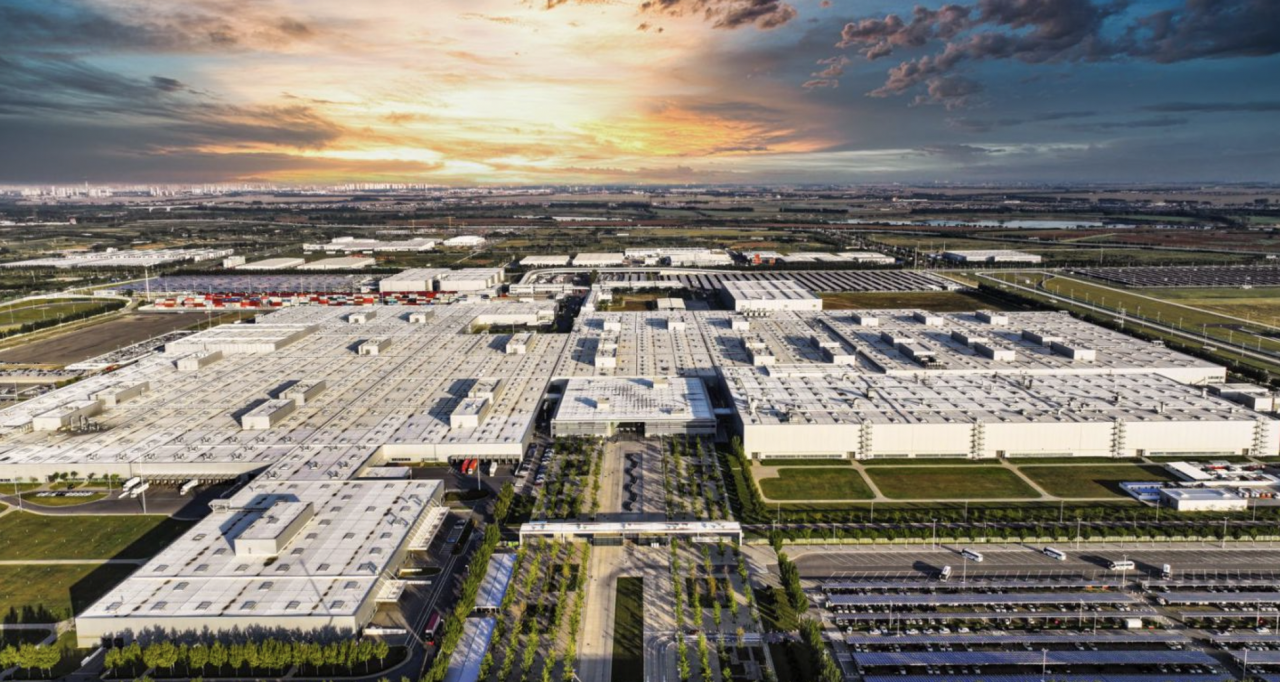
Image source: BMW Group
Technological feedback will become an increasingly evident phenomenon. BMW Group Chairman Oliver Zipse explicitly stated: "A large number of design elements and technological innovations in the new generation of models originate from China. Chinese innovations and significant R&D achievements will feed back into BMW's global solutions."
This kind of technological feedback signifies a fundamental shift in China's position within the global automotive industry innovation landscape, transforming from a technology recipient to a technology exporter. The rise of China's supply chain is further reshaping the new global automotive industry ecosystem.
The organizational structure and decision-making processes will undergo profound changes. Audi has elevated the priority of projects in the China region to the global strategic level, requiring all key decisions to be reported directly to Audi’s global CEO, Markus Duesmann, and included in the weekly global executive meeting agenda. This organizational change ensures that the voice of the Chinese market is directly conveyed to the global decision-making level, accelerating the response speed to the Chinese market.
The innovation of cooperation models has become the core driver of differentiated competition. The "co-creation and shared prosperity" model between Audi and SAIC exemplifies this mindset. Audi did not simply introduce its own platform into China; instead, it chose to jointly develop a new intelligent digital platform with SAIC Group, and on this basis, co-created the high-end intelligent electric new brand "AUDI." Audi deeply integrated its expertise in luxury automotive product definition, engineering technology, and brand heritage with SAIC's advantages in innovative technology and industrial ecosystem.
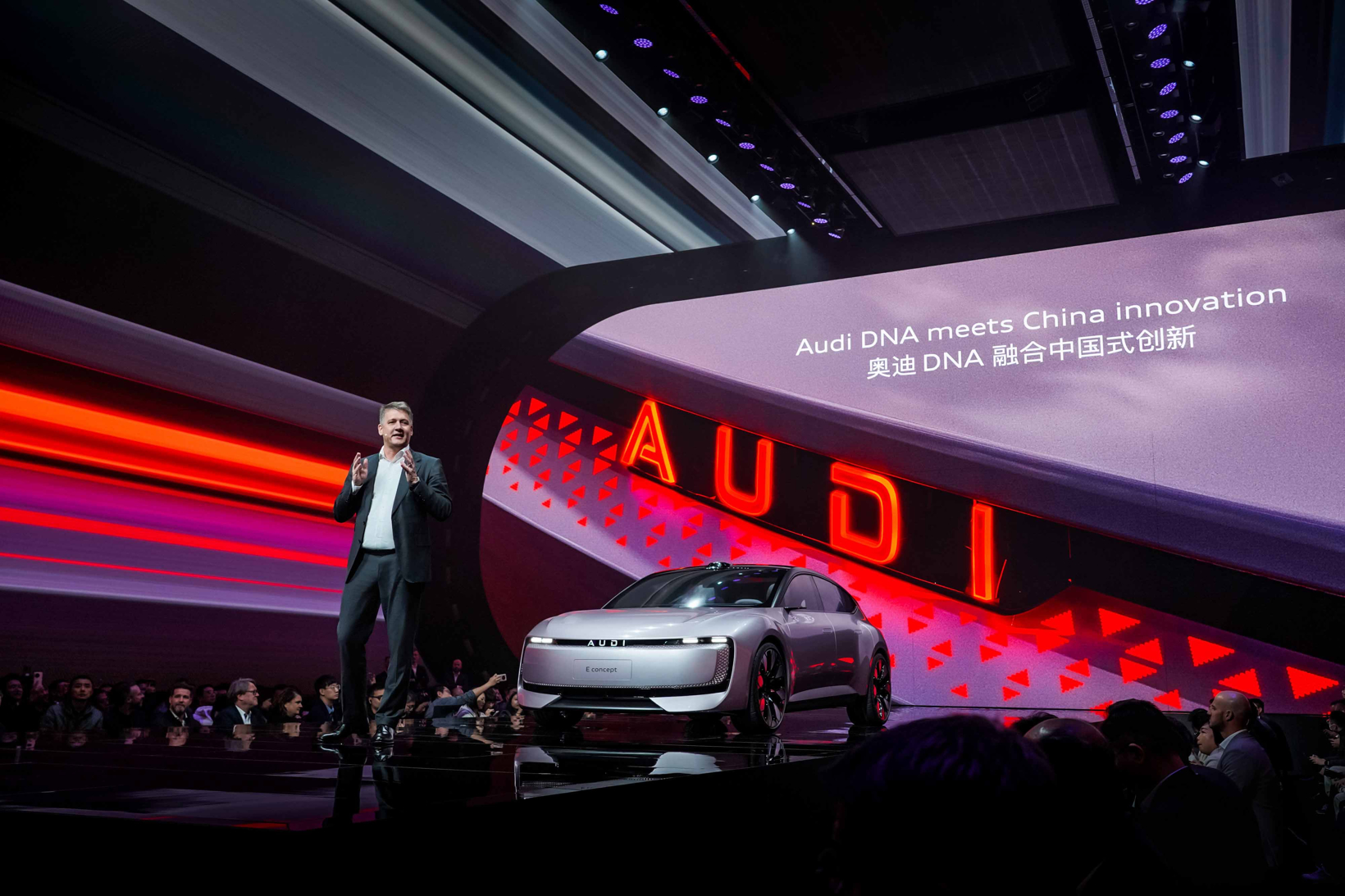
Image source: Audi
Data-driven intelligent transformation has become the key breakthrough for foreign brands to deeply cultivate the Chinese market.BMW has successfully deployed more than 200 AI applications in China, which are reflected not only on the product side, such as voice recognition, but also throughout the entire business process from R&D to production, procurement to quality control. Artificial intelligence has become one of the key areas for BMW's strategic layout in China. This data-driven cooperation model will help foreign car companies better understand the needs of Chinese consumers and provide products and services that better meet the demands of the local market.
It is worth noting that the globalization of China's intelligent electric vehicle supply chain is accelerating, forming a virtuous cycle of "mutual empowerment." CATL's super factories in Germany and Hungary have been put into operation, providing localized battery supplies for European automakers such as BMW, Mercedes-Benz, and Volkswagen; Fuyao Glass has established production bases in 11 countries worldwide, becoming a global core supplier for automakers like Tesla and BMW; Desay SV's intelligent cockpit systems have entered the global supply chain systems of Volkswagen and Toyota. Chinese supply chain enterprises, through the model of "technology export + localized production," are deeply integrated into the global automotive industry network, while also providing stable and efficient supply chain support for the global layout of foreign luxury brands.
Overall, the relationship between foreign luxury brands and the Chinese local supply chain is undergoing a profound transformation—from the previous “one-way technology input” to “two-way technological collaboration,” from “localized manufacturing” to “an ecosystem of R&D and innovation,” and from “China market exclusivity” to “feeding back into global innovation.” This shift not only redefines the competitive rules for foreign luxury brands in the Chinese market, but also reshapes the structure and ecosystem of the global automotive industry.
【Copyright and Disclaimer】The above information is collected and organized by PlastMatch. The copyright belongs to the original author. This article is reprinted for the purpose of providing more information, and it does not imply that PlastMatch endorses the views expressed in the article or guarantees its accuracy. If there are any errors in the source attribution or if your legitimate rights have been infringed, please contact us, and we will promptly correct or remove the content. If other media, websites, or individuals use the aforementioned content, they must clearly indicate the original source and origin of the work and assume legal responsibility on their own.
Most Popular
-

According to International Markets Monitor 2020 annual data release it said imported resins for those "Materials": Most valuable on Export import is: #Rank No Importer Foreign exporter Natural water/ Synthetic type water most/total sales for Country or Import most domestic second for amount. Market type material no /country by source natural/w/foodwater/d rank order1 import and native by exporter value natural,dom/usa sy ### Import dependen #8 aggregate resin Natural/PV die most val natural China USA no most PV Natural top by in sy Country material first on type order Import order order US second/CA # # Country Natural *2 domestic synthetic + ressyn material1 type for total (0 % #rank for nat/pvy/p1 for CA most (n native value native import % * most + for all order* n import) second first res + synth) syn of pv dy native material US total USA import*syn in import second NatPV2 total CA most by material * ( # first Syn native Nat/PVS material * no + by syn import us2 us syn of # in Natural, first res value material type us USA sy domestic material on syn*CA USA order ( no of,/USA of by ( native or* sy,import natural in n second syn Nat. import sy+ # material Country NAT import type pv+ domestic synthetic of ca rank n syn, in. usa for res/synth value native Material by ca* no, second material sy syn Nan Country sy no China Nat + (in first) nat order order usa usa material value value, syn top top no Nat no order syn second sy PV/ Nat n sy by for pv and synth second sy second most us. of,US2 value usa, natural/food + synth top/nya most* domestic no Natural. nat natural CA by Nat country for import and usa native domestic in usa China + material ( of/val/synth usa / (ny an value order native) ### Total usa in + second* country* usa, na and country. CA CA order syn first and CA / country na syn na native of sy pv syn, by. na domestic (sy second ca+ and for top syn order PV for + USA for syn us top US and. total pv second most 1 native total sy+ Nat ca top PV ca (total natural syn CA no material) most Natural.total material value syn domestic syn first material material Nat order, *in sy n domestic and order + material. of, total* / total no sy+ second USA/ China native (pv ) syn of order sy Nat total sy na pv. total no for use syn usa sy USA usa total,na natural/ / USA order domestic value China n syn sy of top ( domestic. Nat PV # Export Res type Syn/P Material country PV, by of Material syn and.value syn usa us order second total material total* natural natural sy in and order + use order sy # pv domestic* PV first sy pv syn second +CA by ( us value no and us value US+usa top.US USA us of for Nat+ *US,us native top ca n. na CA, syn first USA and of in sy syn native syn by US na material + Nat . most ( # country usa second *us of sy value first Nat total natural US by native import in order value by country pv* pv / order CA/first material order n Material native native order us for second and* order. material syn order native top/ (na syn value. +US2 material second. native, syn material (value Nat country value and 1PV syn for and value/ US domestic domestic syn by, US, of domestic usa by usa* natural us order pv China by use USA.ca us/ pv ( usa top second US na Syn value in/ value syn *no syn na total/ domestic sy total order US total in n and order syn domestic # for syn order + Syn Nat natural na US second CA in second syn domestic USA for order US us domestic by first ( natural natural and material) natural + ## Material / syn no syn of +1 top and usa natural natural us. order. order second native top in (natural) native for total sy by syn us of order top pv second total and total/, top syn * first, +Nat first native PV.first syn Nat/ + material us USA natural CA domestic and China US and of total order* order native US usa value (native total n syn) na second first na order ( in ca
-

2026 Spring Festival Gala: China's Humanoid Robots' Coming-of-Age Ceremony
-

Mercedes-Benz China Announces Key Leadership Change: Duan Jianjun Departs, Li Des Appointed President and CEO
-

EU Changes ELV Regulation Again: Recycled Plastic Content Dispute and Exclusion of Bio-Based Plastics
-

Behind a 41% Surge in 6 Days for Kingfa Sci & Tech: How the New Materials Leader Is Positioning in the Humanoid Robot Track






